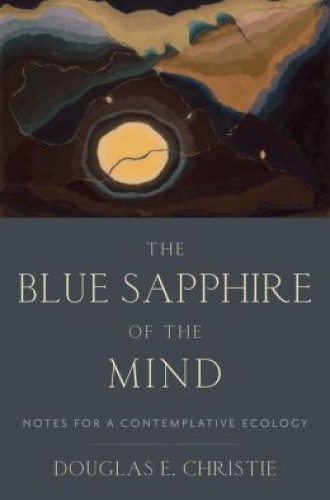The Blue Sapphire of the Mind, by Douglas E. Christie
Philosophy begins in wonder, claimed Plato long ago. In The Blue Sapphire of the Mind, Douglas E. Christie identifies this posture as a good place to start for those who seek to dwell on Earth faithfully and responsibly. Humility, awe and wonder: these attributes mark a path that promises to lead us beyond the ancient call to “fill the earth and subdue it” and into a deeper reverence for its beauty, according to Christie. It is a way that invites us to relate to Earth with care and curiosity, that beckons us to live by means of “an attitude of radical openness to the life of the other, to the world as a whole.”
The ambiguity of the word wonder reminds us that such a disposition can and probably should have a quizzical and even critical edge. How, for example, are we to face unexpected tragedies, the unavoidable ravages of disease, the unpredictable presence of death in our lives? What account can we possibly give to the spoiling of the land for reckless gain, with the threat to species inhabiting such imperiled ecosystems? How are we to manage the persistent and apparently ineradicable conflict between development and conservation? For those who recognize the unavoidability of such questions, Christie’s book will come as a welcome guide, a gathering of spiritual “markings”—to recall the title of Dag Hammarskjöld’s classic volume—that will lead us into a “contemplative ecology.”
Read our latest issue or browse back issues.
This volume belongs to a growing literature devoted to cultivating an “ecological spirituality.” Within this tradition, Christie’s intent is not simply to point toward the outward forms of change required of us. Nor is his aim to carve out an environmental ethic, as important as this is in its own right. Rather, Christie focuses on discerning the inner side, the spiritual depths, of our presence as creatures inhabiting the earth. He hopes that the work of “reorienting contemplative practice . . . toward the local and the particular can help us retrieve a sense of the preciousness of the living world, its utter necessity.” And he calls us to indwell our world as a spiritual practice, one that joins us to a chorus of others—artists and poets, naturalists and scientists, theologians and ethicists—whose wisdom can steer us forward in the midst of environmental perils and ecological uncertainties.
Christie plumbs a wide variety of religious, spiritual and artistic sources and traditions as he leads us adroitly on this journey. He recognizes that as we deepen our sense of the precious vulnerabilities of our world and of our own lives, spiritual aspirations are akin to aesthetic perceptions and moral commitments. He invites us to wonder with him in cultivating a contemplative posture, one that has the interior power to strengthen our ethical commitments and shape our actions on behalf of creation—which, as the apostle Paul put it, is “groaning in travail.”
Christie, already distinguished for his studies of ancient Christian monasticism, makes his case through a thickly layered and often elegantly shaped narrative. He probes ancient and modern Christian theological traditions and contemplative practices, bringing them into dialogue with insights from his own experiences as well as those of a wide and eclectic gathering of theologians and poets, scientists and mystics, activists and philosophers. The book is a veritable feast of wisdom. Christie draws out the often implicit implications of familiar theological teachings in provocative ways, allowing ancient and modern voices to engage each other in conversation.
Throughout the volume, Christie invites readers to become attentive to our world. Drawing on voices as compelling and diverse as Simone Weil and Henry David Thoreau, Athanasius and Annie Dillard, Vincent van Gogh and Thomas Merton, he not only brings readers into conversation with the natural world, with theological traditions both ancient and modern, and with activists and their concerns, he also creates common ground where readers can engage with one another across the spectrum of political and religious differences. With consummate intelligence and probing imagination Christie lures us into seeing the beauty that lies at the heart of our broken world.
In the book’s closing chapter, Christie suggests how we might understand our lives as a way of “practicing paradise” in this life, not merely beyond it. In so doing he initiates us into what St. Benedict called conversatio—a distinctive “way of living” together. Christie guides us into the spiritual depths underlying the ethical and existential urgency so evident in current responses to the environmental crisis.
The Blue Sapphire of the Mind is a beautiful and important book, evocative and alluring, creative and often subtle as it leads us to encounter theological themes in fresh ways. As Christie invites us to enter a complex labyrinth of paths traced by experience and science, theology and the arts, he consistently avoids falling back on stale declarations that, even if true, too easily blunt our capacity to see and feel—the necessary preludes to acting. His work carries echoes of Thoreau’s wise reminder that “the question is not what you look at but what you see.”
These “notes for a contemplative theology” offer us a glimpse of what it might mean to live as if we could “see everything / and ourselves in everything / healed and whole forever,” as the poet Rainer Maria Rilke put it. Such a vision, Christie suggests, is not simply naive fantasy or a case of wishful thinking. It is an enticement to dwell on Earth in a way that enables us to see it in its wholeness. If wonder is the beginning of wisdom, the contemplative ecology that wonder explores points us to love of this world, with all its beauty and brokenness, as the proper shape of the spiritual life.






